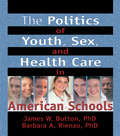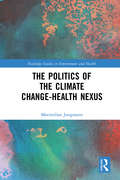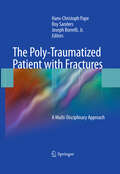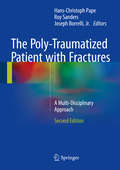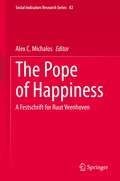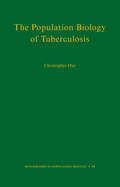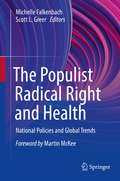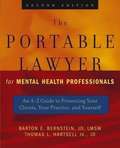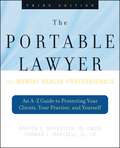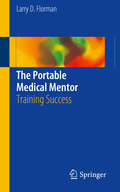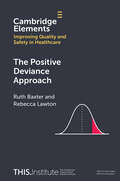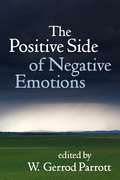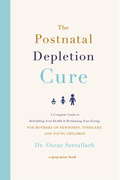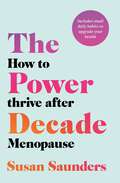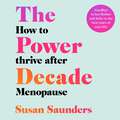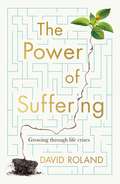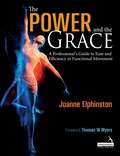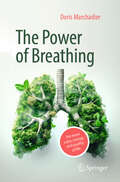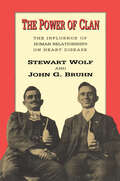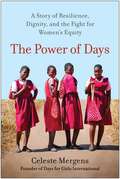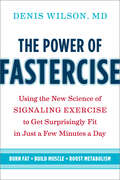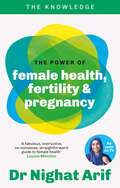- Table View
- List View
The Politics of Youth, Sex, and Health Care in American Schools
by Marvin D Feit Barbara A RienzoExamine school-based health clinics and the political considerations and strategies that can help them succeed!The Politics of Youth, Sex, and Health Care in American Schools reveals the history and political dynamics involved in building and sustaining an important innovation in the way health care services are delivered to America’s youth: the school-based health clinic. These clinics provide vital health services--including crucial yet controversial reproductive services--to youth. In addition to analyzing the nature and extent of the political barriers facing school-based clinics, this vital book describes the strategies that have proven most effective in overcoming them.This essential book begins with an overview of the existing literature on the history and provision of health care for youth. Then it presents the results of a study that utilized a two-pronged approach: a nationwide survey of clinic administrators (supplemented with aggregate data) and intensive case studies of five representative locales. By combining the quantitative data from the national survey with the more qualitative information gleaned from the case study field work, The Politics of Youth, Sex, and Health Care in American Schools can deliver broad yet accurate generalizations as well as detailed interpretation of the authors’findings.This informative and insightful volume explores: the ways that school-based health clinics (SBHCs) have evolved, confronted opposition, and grown day-to-day issues that SBHCs face, including inadequate funding, lack of parental involvement, unsupportive teachers and schools, staffing/training issues, cultural issues, and more sources of opposition to SBHCs, including fundamentalist Protestants, Black Evangelicals, Catholics, and conservative parent groups ways to establish successful school health care reforms issues and recommendations for SBHCs in the futureTo date, there have been very few empirical studies of the politics of school health or of the provision of sexuality-related health services for youth. The greatest depth and breadth of information you can find on the subject is here, in The Politics of Youth, Sex, and Health Care in American Schools.
The Politics of the Climate Change-Health Nexus (Routledge Studies in Environment and Health)
by Maximilian JungmannThis book compares how governments in 192 countries perceive climate change related health risks and which measures they undertake to protect their populations. Building on case studies from the United Kingdom, Ireland, South Korea, Japan and Sri Lanka, The Politics of the Climate Change-Health Nexus demonstrates the strong influence of epistemic communities and international organisations on decision making in the field of climate change and health. Jungmann shows that due to the complexity and uncertainty of climate change related health risks, governments depend on the expertise of universities, think tanks, international organisations and researchers within the public sector to understand, strategize and implement effective health adaptation measures. Due to their general openness towards new ideas and academic freedom, the book shows that more democratic states tend to demonstrate a higher recognition of the need to protect their populations. However, the level of success largely depends on the strength of their epistemic communities and the involvement of international organisations. This volume will be of great interest to students and scholars of climate change and public health. It will also be a valuable resource for policymakers from around the world to learn from best practices and thus improve the health adaptation work in their own countries.
The Poly-Traumatized Patient with Fractures
by Hans-Christoph Pape Roy Sanders Joseph Borrelli Jr.This guide provides practical information for the care of patients with blunt injuries. It covers the care for truncal injuries (head, chest, abdomen) and fracture care of the extremities, the pelvis and the spine in a condensed fashion. Unlike previous, anatomically oriented outlines, this combines the anatomic location with frequent injury combinations. It is written for orthopedic and trauma surgeons, offering them a condensed outline of fracture treatment. In addition, all aspects of trauma care are covered, including associated injuries that may alter the decision making in patients with polytrauma.
The Poly-Traumatized Patient with Fractures
by Jr. Hans-Christoph Pape Roy Sanders Joseph BorrelliThis guide provides practical information on the care of patients with blunt injuries that will be invaluable for emergency personnel, trauma surgeons, orthopaedic traumatologists, and anesthesiologists. The management of both truncal injuries (head, chest, abdomen) and fractures of the extremities, the pelvis, and the spine is covered in a condensed fashion, emphasizing key information. Care is taken to highlight associated injuries that may alter the decision making in patients with polytrauma. The new, revised edition takes full account of three major developments of recent years, namely the increasing economic pressure on health care systems, including trauma care, the changes in trauma systems and related education, and the improved survival of polytrauma patients. In view of the greater recognition of the physical and psychological long-term sequelae of major injuries, post-traumatic stress disorder is discussed in depth in this new edition.
The Pope of Happiness: A Festschrift for Ruut Veenhoven (Social Indicators Research Series #82)
by Alex C. MichalosThis book honors the work of Ruut Veenhoven, who has been a pioneer and leader in the field of happiness studies for the past 50 years. It brings together experts in the field discussing Veenhoven’s work as well as taking up themes from his workshops over the years to analyze how and where the field has expanded following his research. Veenhoven’s contributions include developing theories and measuring instruments, creating the world’s first and largest database of happiness research, founding the world’s first and most frequently cited Journal of Happiness Studies, and student development in and popularization of the field of happiness studies. He has extensive publications through the International Sociological Association and the International Society for Quality of Life Studies, and the research field of happiness studies would not have become as broad today without his enormous contributions. Friends and former students of Veenhoven provide both academic and anecdotal discussions in this festschrift, which is important for anyone interested in the development of happiness research.
The Population Biology of Tuberculosis
by Christopher DyeDespite decades of developments in immunization and drug therapy, tuberculosis remains among the leading causes of human mortality, and no country has successfully eradicated the disease. Reenvisioning tuberculosis from the perspective of population biology, this book examines why the disease is so persistent and what must be done to fight it. Treating tuberculosis and its human hosts as dynamic, interacting populations, Christopher Dye seeks new answers to key questions by drawing on demography, ecology, epidemiology, evolution, and population genetics. Dye uses simple mathematical models to investigate how cases and deaths could be reduced, and how interventions could lead to TB elimination. Dye's analysis reveals a striking gap between the actual and potential impact of current interventions, especially drug treatment, and he suggests placing more emphasis on early case detection and the treatment of active or incipient tuberculosis. He argues that the response to disappointingly slow rates of disease decline is not to abandon long-established principles of chemotherapy, but to implement them with greater vigor. Summarizing epidemiological insights from population biology, Dye stresses the need to take a more inclusive view of the factors that affect disease, including characteristics of the pathogen, individuals and populations, health care systems, and physical and social environments. In broadening the horizons of TB research, The Population Biology of Tuberculosis demonstrates what must be done to prevent, control, and defeat this global threat in the twenty-first century.
The Populist Radical Right and Health: National Policies and Global Trends
by Scott L. Greer Michelle FalkenbachThis contributed volume is the first in-depth analysis of the health policies of populist radical right (PRR) parties worldwide and their actual involvement in health care. The prominence of authoritarian, nationalistic, and populist parties is expanding steadily. However, it is often difficult to discern what kind of policies they really stand for, particularly with regard to the welfare state and public health, where research remains sparse. This book fills this critical gap. The text connects PRR parties and leaders with actual health and social policy effects in Eastern and Western Europe as well as in the United States, Brazil, and the Philippines. The chapters highlight ten individual country case studies authored by young scholars and professors with political science and health experts: The Austrian Freedom Party in Government: A Threat to Public Health? The Alternative for Germany (AfD) and Health Policy: Normalization or Containment of Populist Radical Right Tendencies? Populist Radical Right Influence on Health Policy in the Netherlands: The Case of the Party for Freedom (PVV) The Evolution of the Populist Radical Right and Their Impact on Health in Italy The Populist Radical Right and Health in Hungary Is the Polish 'Law and Justice' (PiS) a Typical Populist Radical Right Party? A Health Policy Perspective The Case of the United Kingdom Independence Party (UKIP) Rhetoric and Reality in the United States of America: Trump, Populism, and Health Policy Ruling Through Chaos in Brazil: Bolsonaro's Authoritarian Agenda for Public Health An Authoritarian Reaction to COVID-19 in the Philippines: A Strong Commitment to Universal Health Care Combined with Violent Securitization The Populist Radical Right and Health is exceptionally timely and essential reading for political science and health colleagues researching and writing about PRR parties and leaders; students and faculty in public health, health and social policy, and political science; and anyone interested in learning more about this topic.
The Portable Lawyer for Mental Health Professionals: An A-Z Guide to Protecting Your Clients, Your Practice, and Yourself
by Barton E. Bernstein Thomas L. HartsellSafeguard your mental health practice with up-to-date information and savvy advice on practicing in today's legal environment. Today's mental health professional must approach the legal aspects of practice with both sensitivity and foreknowledge. The array of legal guidelines and ethical standards to comprehend is increasing in scope and complexity. Licensing issues, ethics questions, and malpractice suits all present pitfalls that, if ignored or misapprehended, can interrupt or even end a career. Written by two attorneys specializing in the legal aspects of mental health care, The Portable Lawyer for Mental Health Professionals, Second Edition is an indispensable survival guide for all clinicians. The authors explain how to handle allegations of malpractice, cope with threats of violence, preserve client confidentiality, and more. Each chapter features step-by-step guidance, helpful case studies, "legal light bulbs" highlighting important concepts, answers to frequently asked questions, dos and don'ts, and sample forms and contracts to help you safeguard your practice.
The Portable Lawyer for Mental Health Professionals: An A-Z Guide to Protecting Your Clients, Your Practice, and Yourself
by Barton E. Bernstein Thomas L. HartsellThoroughly revised, this indispensable survival guide is written for anyone in practice by two attorneys specializing in the legal aspects of mental health care. The authors explain how to handle allegations of malpractice, coping with threats of violence, preserving client confidentiality, and more. Each chapter features step-by-step guidance, helpful case studies, "legal lightbulbs" highlighting concepts and dos and don'ts, and sample forms and contracts to help safeguard your practice. This edition incorporates guidance on conducting business in the digital world, with discussion on distance therapy, confidentiality issues surrounding electronic health records, cloud computing, and more.
The Portable Medical Mentor
by Larry D. FlormanThis text is directed at every student of medicine regardless of level of training or specialty ambitions. Without imparting any education in medicine per se, each chapter teaches the prospective medical trainee the art of being a physician. The reader will be convinced early on, that there is more to being a good doctor than medical school didactics. They will learn what residency admission chiefs, interviewers and faculty are most impressed with in an applicant. The first few chapters speak of the importance of, and being the best student of medicine that one can be. An extensive review of the most current government mandated laws, rules and regulations are in dedicated chapters throughout the text and can be used as a ready reference. The book brings to the reader the very up-to-date and new concepts of the ever confusing and changing realm of managed care. Additionally, one of the main purposes of this book, is to introduce to the student of medicine the use and need of advisors and mentors. This chapter entitled "Mentors" embellishes the age old tradition of true mentoring in medicine, a practice which is just now reviving itself. Medical students, trainees, and practicing physicians at all levels have had an integral part in reviewing and making the chapters more relevant to today's highly competitive and complicated playing field. The Portable Medical Mentor: Training Success addresses every facet of "how to be a good physician" in an easy to read and down to earth, practical fashion. It is intended that once read, the student will be more competitive in residency applications, better thought of as a physician, by peers, and patients, and more comfortable in their chosen specialty.
The Positive Deviance Approach (Elements of Improving Quality and Safety in Healthcare)
by Rebecca Lawton Ruth BaxterPositive deviance is an asset-based improvement approach. At its core is the belief that solutions to problems already exist within communities, and that identifying, understanding, and sharing these solutions enables improvements at scale. Originating in the field of international public health in the 1960s, positive deviance is now, with some adaptations, seeing growing application in healthcare. We present examples of how positive deviance has been used to support healthcare improvement. We draw on an emerging view of safety, known as Safety II, to explain why positive deviance has drawn the interest of researchers and improvers alike. In doing so, we identify a set of fundamental values associated with the positive deviance approach and consider how far they align with current use. Throughout, we consider the untapped potential of the approach, reflect on its limitations, and offer insights into the possible challenges of using it in practice. This title is also available as Open Access on Cambridge Core.
The Positive Side of Negative Emotions
by W. Gerrod ParrottThis unique volume brings together state-of-the-art research showing the value of emotions that many believe to be undesirable. Leading investigators explore the functions and benefits of sadness, anxiety, anger, embarrassment, shame, guilt, jealousy, and envy. The role of these emotions in social interactions and relationships is examined, as are cultural differences in how they are valued and expressed. The volume considers how people seek out these feelings in everyday life to improve performance, gain insight, and express cares and commitments. Negative emotions are shown to have an important place in a rich and meaningful life.
The Post-Pandemic World and Global Politics
by A K Ullah Jannatul FerdousThe book examines the impact of COVID-19 on economic and political processes, contending that the global reaction to the pandemic has been the largest failure in scientific policy in a generation. Unlike earlier crises, it has impacted the world's leading economies while also paralyzing international ties, provoking diverse and far-reaching reactions. The authors posit that no effective global response has been launched in response to this global catastrophe. Rather, governments have implemented a variety of policies based on the costs of virus protection against financial closure and isolation. In doing so, there has been a resurgence in nationalism. This book aims to provide comprehensive understanding of how the pandemic has widened political gaps, and demarcates what the long-term consequences might be in terms of policies and economics in the wake of the pandemic. Of interest to scholars in political geography, development studies, international relations, public administration, and health science, this book presents key observations on existing theories of global politics pivoted around the COVID-19 pandemic, and its ramifications on individuals, groups, and ultimately, the nation state.
The Postnatal Depletion Cure: A Complete Guide To Rebuilding Your Health And Reclaiming Your Energy For Mothers Of Newborns, Toddlers And Young Children
by Dr Oscar SerrallachIt's all too common to hear new mums talk about 'baby brain' and extreme fatigue. But what if it wasn't the physical toll of giving birth, breastfeeding or chasing a toddler that was sapping your strength? What it if was something deeper? Dr. Oscar Serallach has spent his medical career witnessing women fail hormonally, nutritionally and emotionally to get back on their feet after having a baby. The true cause? A syndrome he calls postnatal depletion. THE POSTNATAL DEPLETION CURE is the first book to name the syndrome and to offer a practical programme to help mothers replenish their bodies after having a baby. The book includes a comprehensive guide to the nutrients women need to enhance organ function and balance hormones, along with advice on how to maintain a healthy diet and exercise routine and get necessary rest, despite the demands of motherhood. Filled with prescriptive takeaways and many success stories, THE POSTNATAL DEPLETION CURE will help mothers be the best they can be physically and emotionally.
The Power Decade: How to Thrive After Menopause
by Susan SaundersThe menopause is a time of change, of unexpected health challenges, of rollercoaster emotions and unprecedented shifts in how we feel physically and emotionally. But we can emerge wiser than before, and stronger than we know. The decade after the average menopause transition, from our 50s to 60s, is the most important for a woman's health. We are ageing in an environment that doesn't nurture midlife women and the reproductive hormones which protected our health for so long have waned. But this is also an opportunity to power ahead, to decide who we are and how we want to live as we face the future.There are huge positives post-menopause: it's time to create the adventures - large and small - we want in our lives. The decisions, and choices, we make now will define how we age. And the foundation for this? Our health, physical and mental. In The Power Decade, health coach and age-well advocate Susan Saunders presents a comprehensive guide to wellness for women in their 50s and 60s. She interviews medical experts and reveals stories of inspiring women who are powering up post-menopause. Also included are impactful, practical tips - on mindset, meals and movement - so you can create your own power decade.Susan talks to experts about all areas of a woman's life and looks at:*What's happening in your body post-menopause *What is good nutrition post-menopause?*How to exercise post-menopause*How to get your mindset on track to create your Power Decade *How to get motivated for the best possible health
The Power Decade: How to Thrive After Menopause
by Susan SaundersThe menopause is a time of change, of unexpected health challenges, of rollercoaster emotions and unprecedented shifts in how we feel physically and emotionally. But we can emerge wiser than before, and stronger than we know. The decade after the average menopause transition, from our 50s to 60s, is the most important for a woman's health. We are ageing in an environment that doesn't nurture midlife women and the reproductive hormones which protected our health for so long have waned. But this is also an opportunity to power ahead, to decide who we are and how we want to live as we face the future.There are huge positives post-menopause: it's time to create the adventures - large and small - we want in our lives. The decisions, and choices, we make now will define how we age. And the foundation for this? Our health, physical and mental. In The Power Decade, health coach and age-well advocate Susan Saunders presents a comprehensive guide to wellness for women in their 50s and 60s. She interviews medical experts and reveals stories of inspiring women who are powering up post-menopause. Also included are impactful, practical tips - on mindset, meals and movement - so you can create your own power decade.Susan talks to experts about all areas of a woman's life and looks at:*What's happening in your body post-menopause *What is good nutrition post-menopause?*How to exercise post-menopause*How to get your mindset on track to create your Power Decade *How to get motivated for the best possible health
The Power Decade: How to Thrive After Menopause
by Susan SaundersA positive outlook on 'the other side' of the menopause, and what it can mean for you in your 50s and 60s.The menopause for many women is a daunting time of change, of unexpected health challenges, of rollercoaster emotions and unprecedented shifts in how we feel physically and emotionally. But we emerge wiser than before, and stronger than we know. For many, the years immediately post-menopause bring other seismic changes too - empty nests, re-evaluated careers, losses and gains as individual as we are. The decade that takes us from our early 50s to early 60s is a time for us to take stock, to power ahead, to decide who we are and how we want to live as we face the future. And the foundation for that, whatever those decisions might be? Our health, physical and mental. The years immediately after the menopause are the most important for a woman's health: the actions we take now will shape and define the rest of our lives. At the same time, we're dealing with everything from falling hormone levels to weakening bones: add in a pervading feeling that we've lost identity and we have a toxic environment in which to grow older. But this is the time to step away from the prevailing narrative of failing faculties and oncoming illness and instead power up to make the changes which will define how we age. From now, for the rest of our lives...Susan talks to experts about all areas of a woman's life and looks at:What's happening in your body post-menopause. What is good nutrition post-menopause?How to exercise post-menopauseHow to get your mindset on track to create your Power Decade How to get motivated for the best possible health (P) Headline Publishing Group Ltd 2023
The Power Of Suffering
by David RolandThe Power of Suffering is psychologist David Roland&’s personal investigation into the nature of human suffering. When our world is turned upside down, what does it do to us, how do we survive it, and, most importantly, how can we grow as a result? David takes the lived experience of eleven incredible people and follows them along each step of their journey from crisis through to acceptance and triumph. Within each story, David draws on his own experience of life-altering trauma and clinical research to offer insights we all can gain from. Each life story examined is a moving testimony of the human spirit&’s ability to rise and rise again – an executive tragically loses his family in a car crash and finds healing in the rehabilitation of wildlife, a teenage victim of domestic violence becomes a fierce advocate for abused women and brain-injured youth, a football superstar overcomes bigotry and dyslexia to forge a career in acting, a mother experiences the aching depth of love lost after her teenage child&’s life is tragically cut short. These are but a few of the intimately told stories, all pointing to a path through the storm and beyond.The Power of Suffering is a revelatory account of how the darkest night can lead to the most profound dawn.
The Power and the Grace: A Professional's Guide to Ease and Efficiency in Functional Movement
by Joanne ElphinstonDesigned for Pilates and yoga teachers, health and rehabilitation professionals, 'The Power and the Grace' demystifies functional movement and integrates the science of movement with the art of teaching it. It aims to help the holistically minded movement professional achieve rewarding results in neuromuscular function. From brain science to physics, fascia to emotion, this book distils a seemingly complex field into a practical and instantly usable approach that will resonate with movement teachers at all levels of experience. Find the color in your language; learn the difference between talking to the brain or to the mind; and discover how to communicate the intention and sense of a movement with ease!
The Power of Breathing: For More Calm, Energy, and Quality of Life
by Doris MarchadierHave you ever experienced the calming effect of a deep breath? With this guide, you will learn how intuitive breathing can improve your quality of life. Targeted breathing techniques help you navigate your daily life with more calmness. Whether you suffer from chronic respiratory diseases like asthma and COPD, want to reduce pain, or strengthen your mental well-being and immune system – this guide offers practical exercises to help you consciously use your breath, bringing more peace, energy, and balance into your life.From the contents: The universal power of breathing and its history, the anatomy and functioning of the respiratory system, targeted breathing techniques for stress, inner tension, and healthy sleep, and the connection between breathing and meditation
The Power of Clan: Influence of Human Relationships on Heart Disease
by Stewart WolfMedical sociologists have long recognized the importance of community and family structure in the health of individuals. However, the past quarter century in America has seen an increasing emphasis on individualism and materialism that has effectively diminished the cohesiveness and emotional support provided by these basic social units. The Power of Clan examines the health effects of social change in a largely Italian-American town over a twenty-five-year period and provides substantial evidence of the protective effect of family bonds and shared social values against coronary heart disease and sudden death.The unique feature of the Roseto, Pennsylvania community was its remarkably low death rate from heart attacks, this in spite of the fact that such risk factors as smoking, lack of exercise, high fat and cholesterol diet were found to be just as prevalent in Roseto as in four nearby control towns. Roseto's traditional, family-oriented social structure, however, differed vastly from that of neighboring towns where materialistic values were predominant and where the individual, rather than the family, was considered to be the unit of society.At the beginning of their study in the early 1960s, the authors noted indications of imminent social change toward a more Americanized system of values and behavior. Interviews with younger inhabitants revealed much respect for old-world traditions but not as much enthusiasm for living by them. The study's prediction that the abandonment of selfless, communal standards would undermine Rosetans relative immunity to heart disease was borne out as death rates from heart attack climbed to levels comparable to those of the control towns by 1975. The Power of Clan is the product of twenty-five years of continuous observation. The findings of its original study have been carefully examined and its predictions largely confirmed. It is a landmark volume in the longitudinal study of health in an advanced industrial society. It also constitutes a large step forward in the cooperation of medical and sociological researchers.
The Power of Days: A Story of Resilience, Dignity, and the Fight for Women's Equity
by Celeste MergensThe journey to overcome one of the world&’s most prevalent taboos is proof that no divide is impossible to bridge. This is the story of one woman&’s path to create a grassroots effort that has now helped nearly 3 million women and girls in 145 countries on 6 continents—and isn&’t stopping there. Every month, millions of girls and women around the world miss school and work during their periods because they don&’t have access to menstrual products such as pads or tampons. In 2008, Celeste Mergens was working with an overcrowded orphanage on the outskirts of Nairobi, Kenya, when she learned that menstruating girls there sat on cardboard in their rooms for several days each month. This set into motion a seemingly simple idea—combining a washable, long-lasting pad with taboo-breaking health education—that became a catalyst for an unlikely global movement for equity. By creating opportunities and inclusive invitations for others to join, that movement grew to become the award-winning nonprofit Days for Girls. In this book, Mergens offers insight into what allowed her to face every obstacle with a positive mindset, determination, and humility. The challenges Mergens faced and the lessons she learned, personally and professionally, and the triumphs and resourcefulness of leaders all over the globe are illuminating to all who wish to make a difference and create a more equitable world. The Power of Days is a story of a social shift and a legacy for future generations—one that highlights the powerful impact we can have when we come together.
The Power of Fastercise: Using the New Science of Signaling Exercise to Get Surprisingly Fit in Just a Few Minutes a Day
by Denis WilsonA revolutionary program of short burst, high-intensity exercise that uses your body's signals to curb hunger as it burns fat and builds muscleOver the last 26 years, thyroid pioneer Denis Wilson, MD, has trained thousands of physicians on the crucial relationships between the thyroid system, metabolism, and body temperature. He&’s heard patients recount their inability to get fit using conventional approaches, and he&’s understood their frustration. Based on the latest medical research, Dr. Wilson has created fastercise, a revolutionary practice that uses brief, strategically timed bursts of exercise to cancel hunger pangs, allowing people to more easily stick to a healthy eating plan and shift their bodies toward becoming leaner, faster, smarter, stronger, and healthier. Fastercise holds the promise of vindicating and liberating many of those who have struggled to improve their fitness, enabling them to transform their lives and reach their full potential.By combining simple analogies and clear explanations of the physiology of the body&’s energy pathways and response to food and exercise, Dr. Wilson reveals how conventional approaches to dieting and weight management can actually fight against the body&’s priorities and lead to frustration and poor results. Fastercise is a time-efficient, convenient, and natural approach powerfully signals the body to burn fat and build muscle synergistically, leading to surprisingly beneficial and quick results. The Power of Fastercise explains how fastercise can help you:• Burn fat without going hungry• Build your mitochondria to burn more fat and provide greater energy• Stimulate muscle growth in just a few minutes a day• Shift your body composition to less fat and more muscle• Boost your body temperature and metabolic rate• Look and feel younger• Increase mental focus, learning, and productivity• Decrease insulin resistance• Decrease inflammation and improve immune function• Improve respiratory fitness and athletic performance• Get great results with any healthy diet, including low-carb and high-carb In this groundbreaking book, Dr. Wilson lays out simple, practical strategies for combining fastercise with smart eating choices. Fastercise can provide excellent results for a wide range of people: seasoned athletes, fitness enthusiasts, and even those who dislike exercising or have physical limitations. Whatever your fitness goals are, fastercise can help you achieve them.
The Power of Female Health, Fertility & Pregnancy: The pocket guide to female health from one of TV's best loved doctors (The Knowledge)
by Dr Nighat ArifITV This Morning's GP Dr Nighat Arif brings you the essential guide to female health from puberty to menopause.This book tackles important topics including:- Planning for pregnancy, including specific advice for LGBTQ+ parents- How pregnancy affects your body and complications to know about- Facing infertility and your options, including medicine to improve fertility and assisted conception- Health concerns including endometriosis, polycystic ovary syndrome and gynaecological cancersThe Power of Female Health, Fertility & Pregnancy encompasses all experiences, including the perspectives of women of colour, people of all cultures, and the transgender community to ensure that all groups affected by female health concerns are a part of vital conversations.For all women and people assigned female at birth, whether you are navigating your pregnancy journey or exploring your symptoms and wondering what to check, when, this book covers everything you need to know.Content from this book previously appeared in the hardback edition of The Knowledge: Your Guide to Female Health from Menstruation to the Menopause
The Power of Female Health, Fertility & Pregnancy: The pocket guide to female health from one of TV's best loved doctors (The Knowledge)
by Dr Nighat ArifITV This Morning's GP Dr Nighat Arif brings you the essential guide to female health from puberty to menopause.This book tackles important topics including:- Planning for pregnancy, including specific advice for LGBTQ+ parents- How pregnancy affects your body and complications to know about- Facing infertility and your options, including medicine to improve fertility and assisted conception- Health concerns including endometriosis, polycystic ovary syndrome and gynaecological cancersThe Power of Female Health, Fertility & Pregnancy encompasses all experiences, including the perspectives of women of colour, people of all cultures, and the transgender community to ensure that all groups affected by female health concerns are a part of vital conversations.For all women and people assigned female at birth, whether you are navigating your pregnancy journey or exploring your symptoms and wondering what to check, when, this book covers everything you need to know.Content from this book previously appeared in the hardback edition of The Knowledge: Your Guide to Female Health from Menstruation to the Menopause
